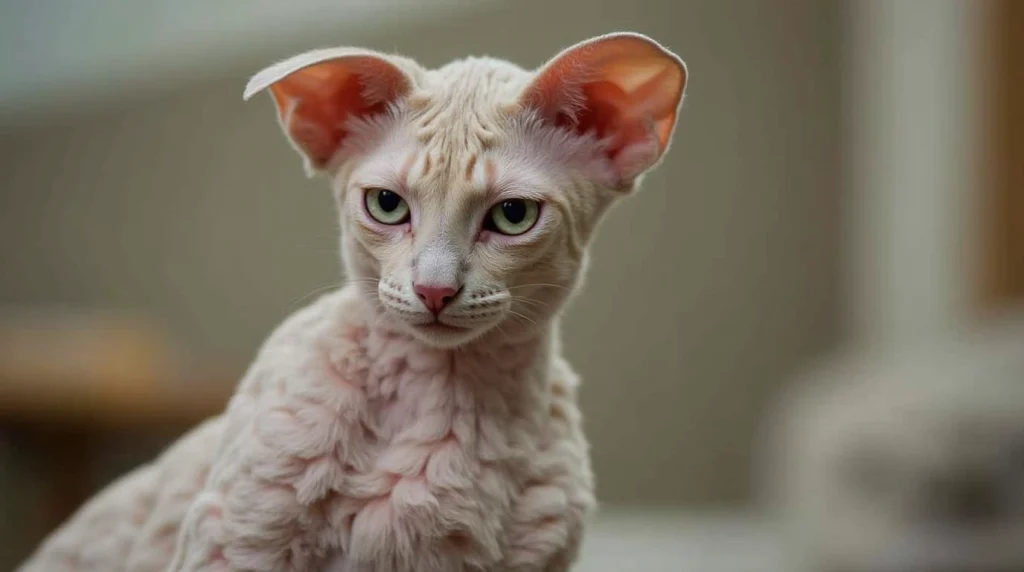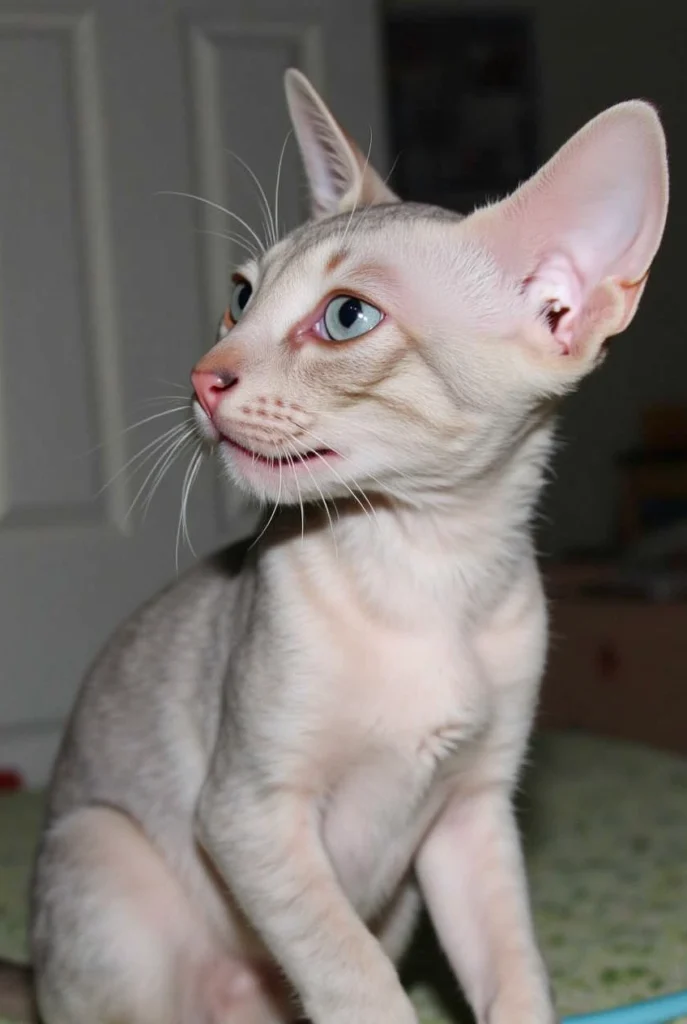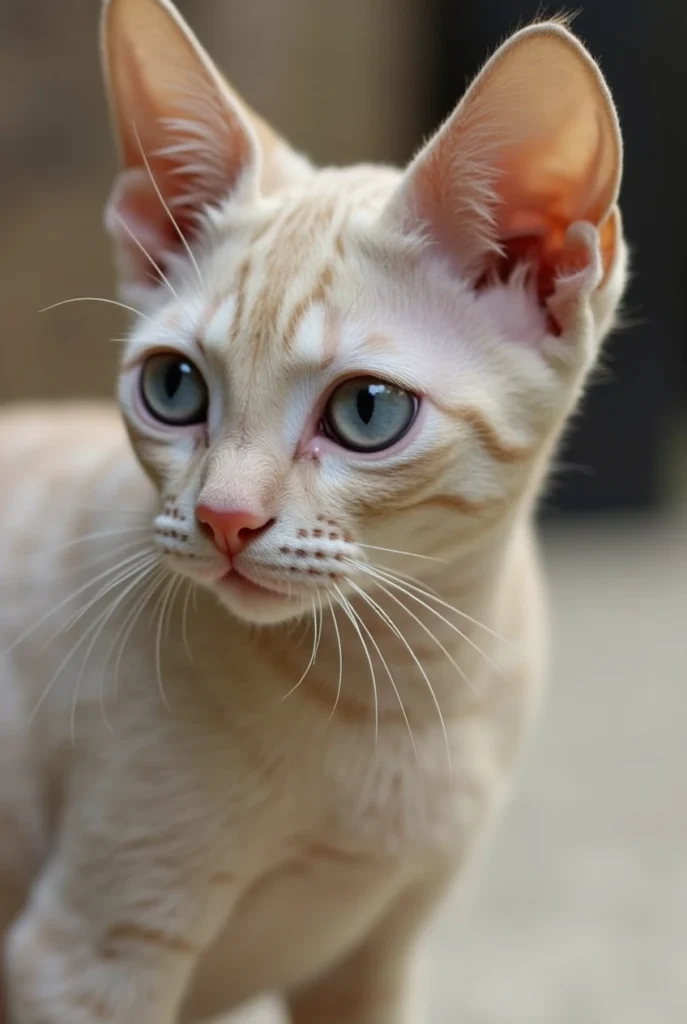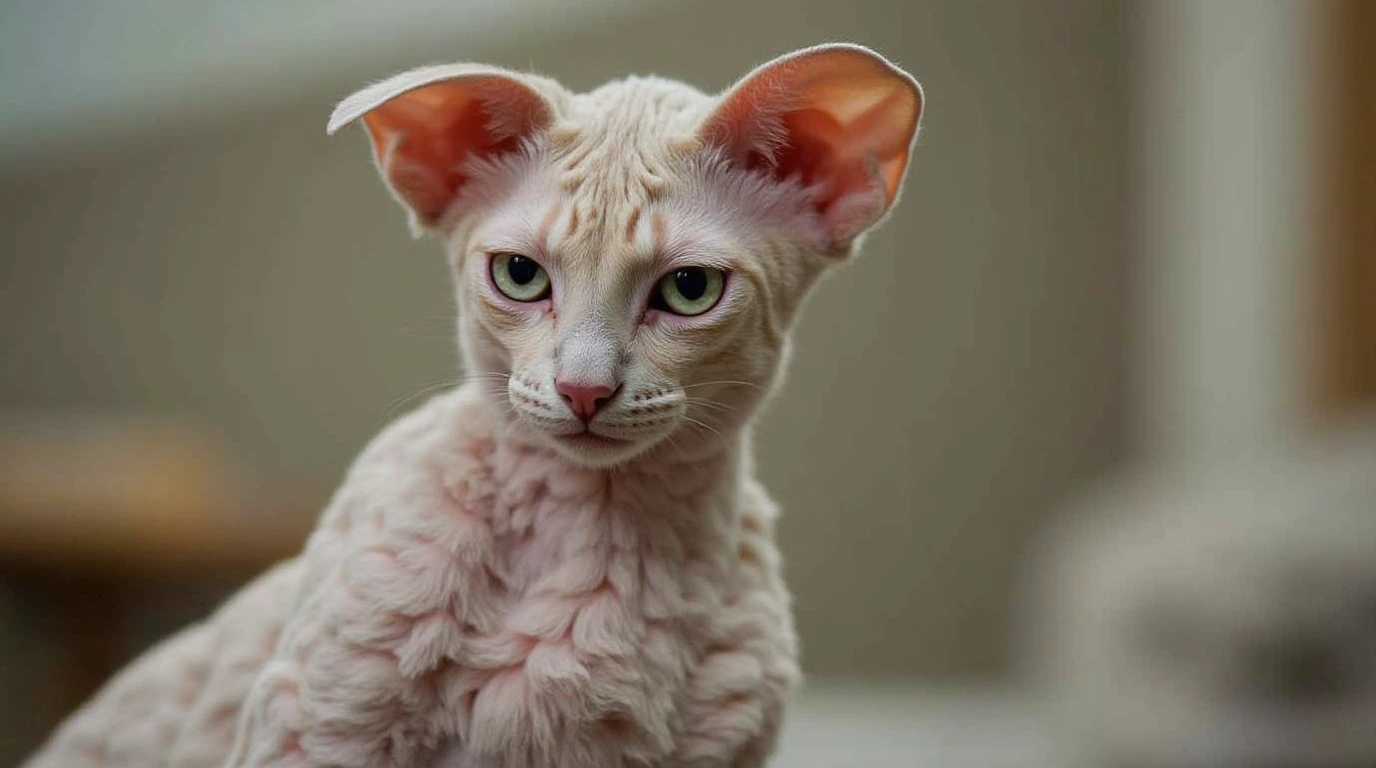If you’ve ever wondered what would happen if a mischievous imp, a lap-loving shadow, and a circus acrobat were somehow rolled into one purring creature—the answer might just be the Devon Rex. Known for its signature curly coat and alien-chic features, this breed turns heads, warms laps, and claims hearts in equal measure. But behind the big ears and impish stare lies a cat that’s surprisingly complex: playful but needy, delicate but bold, cuddly but not always calm.

This guide unpacks everything you need to know—whether you’re considering adoption or already living with one of these curly-coated comedians. From their quirky grooming needs to the emotional rollercoaster of their attention-seeking ways, we’ll dive deep into what makes the Devon-Rex both enchanting and demanding. Ready to find out if this “poodle cat” is your soulmate or your adorable nemesis?
Table of Contents
Origins of the Devon Rex
The Devon Rex didn’t just show up—it made an entrance. In 1960s Devonshire, England, a curly-coated kitten named Kirlee was discovered living near a tin mine, sparking the birth of an entirely new feline lineage. What’s wild is that Kirlee’s curls weren’t a fluke—they stemmed from a completely separate genetic mutation than the similarly curly Cornish Rex. This twist of biology gave rise to a breed that looks like it skipped the evolutionary queue and landed somewhere between an Egyptian statue and a house gremlin.
Unlike many modern breeds sculpted in show rings or laboratory breeding programs, the Devon-Rex’s beginning feels almost mythical—like nature left a love letter in the form of a mutant kitten. From Kirlee, careful selective breeding ensured the unique coat and features remained, while slowly building a reliable gene pool. By the early ’70s, breed associations globally had started taking notice, giving the Devon Rex its official status.
A Curly Coincidence—or Destiny?
The Devon’s emergence shortly after the Cornish Rex led to confusion at first. Breeders quickly realized the two curls were genetically incompatible. That difference is what helped cement the Devon as a standalone breed rather than a variation of its Cornish cousin.
FAQ – Was the Devon Rex an accidental breed?

Yes—but a happy accident. The breed began from a natural mutation, not human design. Breeders later refined it, but the Devon-Rex started with one strange, curly kitten and a stroke of luck.
Let’s not sugarcoat it—the Devon Rex doesn’t just look different; it looks like it crashed a sci-fi convention and never left. With its oversized, low-set ears, wide oval eyes, and angular cheekbones, this cat often gets compared to elves, aliens, or anime characters. But it’s the coat that really seals the deal: short, curly, and so fine it’s more like peach fuzz than fur.
Their fur doesn’t behave like most cats’. It’s sparse, sometimes patchy, and composed primarily of the soft undercoat—called “down”—with very few guard hairs. That makes it prone to breakage, hence the brittle or absent whiskers you’ll often see. Some even call their coat a “Marcel wave,” borrowed from vintage 1920s hairstyles. It’s not just fur; it’s a statement.
Despite their fragile look, Devons have a surprisingly athletic, muscular frame. They’re lean but solid—built to leap, scale, and pounce like feline parkour pros. And thanks to their slim build and oversized ears, they often look permanently alert, like they’re always plotting something (which they usually are).
Fun Fact – Do all Devon Rexes have curly fur?
Mostly, yes. The curliness is a signature trait, but some Devons may have patchier or less pronounced waves. Their coat can change texture slightly with age or health.
Personality Traits of the Devon Rex
If you’re imagining a cat that curls up in a corner and minds its business—think again. The Devon-Rex is more like a mischievous child in fur. These cats are wildly social, emotionally expressive, and constantly curious. They don’t just want to be in the same room as you—they want front-row seats to your life, every second.
Devons are known for their dog-like behavior: they follow you from room to room, perch on shoulders, greet guests, and may even fetch. Their high intelligence makes them trainable, but also a bit manipulative—they know how to get what they want and aren’t shy about demanding it.
They thrive on interaction. Leave them alone too long, and they’ll invent their own fun (read: chaos). But give them the stimulation they crave—climbing shelves, puzzle toys, attention on tap—and they’ll repay you with relentless affection and hilarious antics.
Why Are Devon Rex Cats So Energetic?
Their high energy is baked into their DNA. This breed evolved with a lean, athletic build and a curious nature, which fuels their constant need to move, explore, and engage.
Is the Devon Rex Hypoallergenic?
Short answer: not quite—but it’s complicated. The Devon-Rex is often labeled “hypoallergenic” because of its fine, sparse coat and minimal shedding. And yes, many allergy sufferers do report fewer symptoms around this breed. But don’t let the curls fool you—no cat is truly allergen-free. The real trigger, a protein called Fel d 1 found in saliva and skin, is still present.
However, fewer hairs floating around means fewer allergens circulating, which can help milder allergy cases. Regular bathing and wiping down the cat can reduce allergen levels, too. So, if you have sensitivities but still dream of feline companionship, the Devon-Rex might be one of your better bets—but always test first.
Can People with Cat Allergies Own a Devon Rex?
Sometimes, yes. Many allergy sufferers find Devon Rexes more tolerable due to less shedding, but reactions vary. Always spend time with the breed before committing.
Daily Life With a Devon Rex
Living with a Devon-Rex is like having a furry sidekick who thinks they’re part of your Wi-Fi network—constantly connected. These cats thrive on interaction. Expect them to join you in the bathroom, supervise your work calls, and nestle into your hoodie like it’s a mobile throne. Alone time? Not their style.
They need mental and physical stimulation daily—think climbing trees, interactive toys, and rotating games. Without it, they’ll get inventive (read: mischief). They’re happiest in households where someone is usually home or where they have other animal companions.
Can a Devon Rex Be Left Alone During the Day?
Not ideal. While they can handle short periods, Devons crave attention. Long hours alone often lead to boredom and destructive behavior. A second pet or daily enrichment can help.
How to Care for a Devon Rex
Despite their low-shedding curls, Devon-Rex cats require unique care. Their delicate coat tends to accumulate skin oils, so gentle weekly bathing is key—not optional. Regular ear cleaning is another must; those signature satellite-dish ears trap wax fast. And because their fur doesn’t insulate well, they get cold easily. Expect to offer cozy blankets, sunny windows, and maybe even a cat sweater or two.
Nutrition matters too. Their high metabolism and active nature call for quality food, often in smaller, more frequent meals.
Do Devon Rex Cats Need Regular Grooming?
Yes—but gently. Weekly baths and ear checks are essential. Harsh brushing can damage their coat, so opt for soft grooming mitts or damp cloth wipes.
Common Health Issues in the Breed
While generally healthy, the Devon-Rex does come with a few medical quirks. Hereditary myopathy, a muscle weakness disorder, can appear in kittens. Some may also face hypertrophic cardiomyopathy (HCM), a heart condition found in various cat breeds. Their sensitive skin makes them prone to conditions like seborrhea, dermatitis, or hypotrichosis (patchy fur loss). Their large ears? Magnet for ear infections.
Routine vet visits and genetic screenings can help catch issues early—especially if you’re buying from a breeder.
Should I Get Health Testing for My Devon Rex?
Absolutely. Reputable breeders screen for myopathy, HCM, and skin issues. Ask for documentation before adopting.

Pros & Cons of Owning a Devon Rex
Choosing a Devon-Rex isn’t just a breed preference—it’s a lifestyle shift. These cats bring boundless affection, endless curiosity, and social energy into your home. But they’re not for the faint of heart or the “leave it alone and forget it” pet parent.
✅ Pros:
- Highly affectionate and people-oriented
- Low-shedding coat (less fur on furniture)
- Intelligent and trainable
- Great with kids and other pets
- Comical and entertaining behavior
❌ Cons:
- Requires frequent grooming and ear cleaning
- Doesn’t tolerate long periods alone
- Sensitive to cold and skin irritation
- Potential hereditary health risks
Are Devon Rex Cats Good for First-Time Owners?
Yes, if you’re present. They’re loving and adaptable—but their neediness and grooming demands require engaged, attentive care.
FAQs About Devon Rex Cats
Do Devon Rex cats meow a lot?
Yes, they’re vocal—but not annoyingly so. Many owners describe their meows as soft, chirpy, and used to communicate affection or curiosity rather than demands.
Are Devon Rex cats good with dogs?
Absolutely. They’re one of the most dog-friendly cat breeds—playful, unafraid, and eager to engage with gentle, respectful canines.
How long do Devon Rex cats live?
On average, 9–15 years, though many live into their late teens with proper care and vet attention.
Do they need sweaters?
Often, yes. Their thin coat means they get chilly quickly, especially in cooler homes. They tend to love warm blankets, heaters, and even cat clothing.
Final Thoughts: Is the Devon Rex Right for You?
The Devon*Rex isn’t just a cat—it’s a character. If you’re looking for a quiet, low-maintenance feline, this might not be your match. But if you crave a companion who greets you at the door, perches on your shoulder, and stares into your soul like they’re reading your thoughts? Then yes—this whimsical, needy, hilarious breed might be your perfect sidekick.
Life with a Devon-Rex means never being alone… and never being bored.
The Devon Rex is a playful, affectionate cat breed known for its curly coat, oversized ears, and dog-like behavior. Ideal for active homes, it requires gentle grooming, warmth, and attention. While not fully hypoallergenic, it may suit some allergy sufferers due to minimal shedding.

